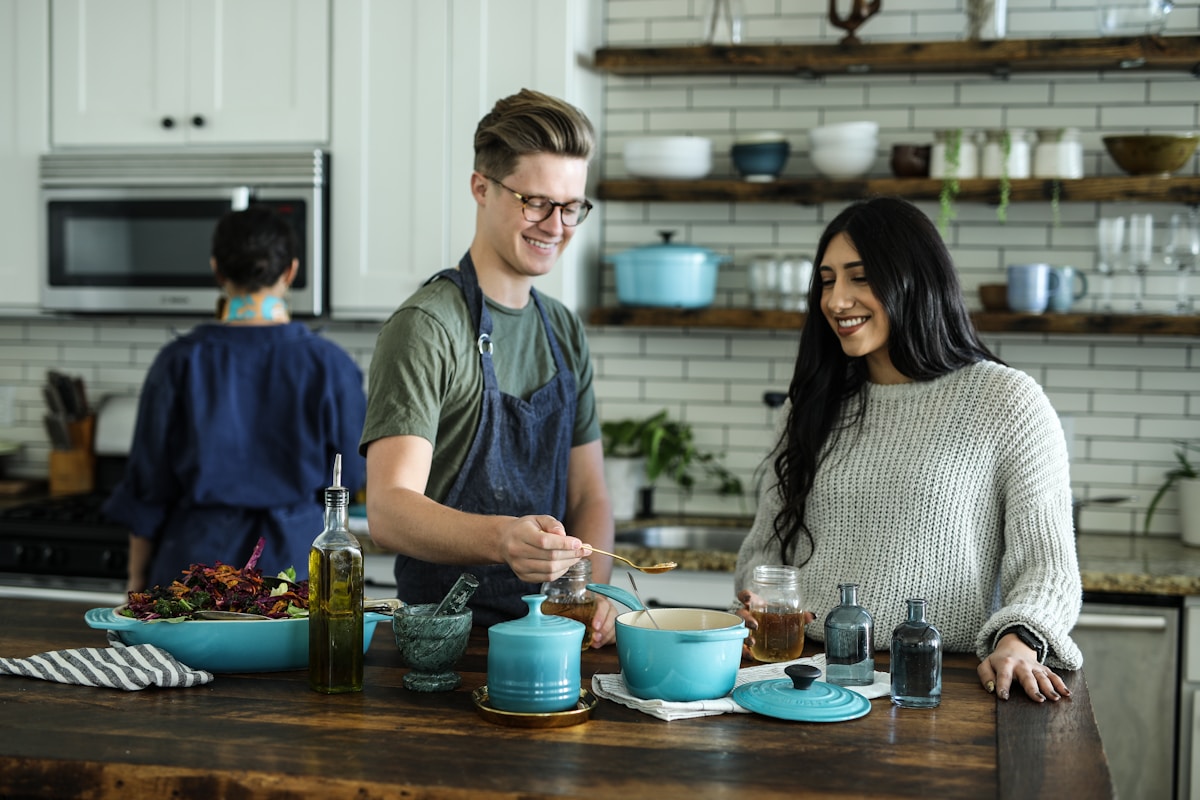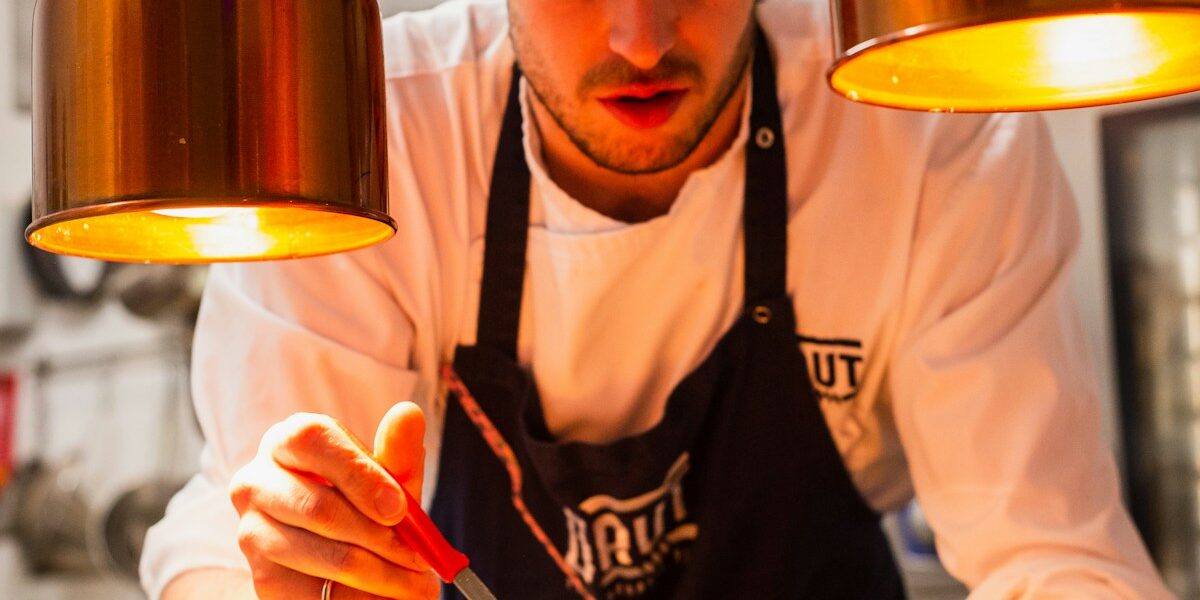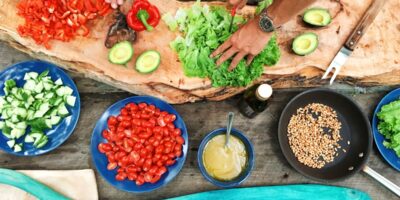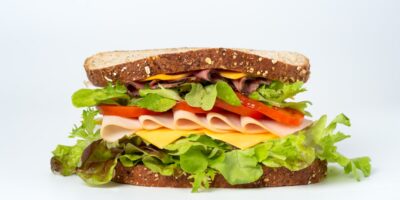Culinary Tips for Home Chefs

Cooking at home can be a rewarding experience. Here are some practical tips to help you improve your culinary skills and make your meals even more enjoyable.
Organize Your Kitchen
A well-organized kitchen makes cooking much more efficient. Start by grouping similar items together. Keep frequently used utensils and spices within reach. Store pots, pans, and baking sheets where you can easily access them. Creating an efficient workflow reduces stress and saves time when preparing meals.
Invest in Quality Knives
Good quality knives make a significant difference. A sharp knife is not only safer but also more effective. Aim for a chef’s knife, a paring knife, and a serrated knife. Regularly hone your knives using a honing steel and sharpen them professionally as needed.
Master Basic Knife Skills
Knowing how to properly hold and use a knife can improve your cooking technique. Practice the claw grip, where your non-dominant hand holds the food with fingers curled under. This method protects your fingers. Learn basic cuts like dicing, slicing, and julienning. Efficient and uniform cuts ensure even cooking and a better presentation.
Heat Your Pans Properly
Heating your pan before adding ingredients helps achieve better cooking results. A hot pan ensures even browning and prevents food from sticking. Wait a few minutes until the pan is evenly heated before adding oil or other ingredients.
Use Fresh Ingredients
Fresh ingredients often result in superior flavors. Whenever possible, use seasonal produce. Visit local farmers’ markets to find fresh vegetables, fruits, and herbs. Fresh ingredients can elevate your dishes and make them more vibrant.
Taste As You Cook
Seasoning your dish throughout the cooking process helps develop complex flavors. Taste your food at different stages and adjust seasoning gradually. This ensures a balanced final dish.
Use Salt Wisely
Salt is a key element in cooking but should be used carefully. Start with a small amount and add more as needed. Different types of salt, such as kosher salt or sea salt, have varying levels of salinity, so adjust accordingly. Remember, you can always add more salt, but reducing excess salt is difficult.
Experiment With Herbs and Spices
Herbs and spices can transform a dish. Try using fresh herbs like basil, rosemary, or thyme for a burst of flavor. Toast whole spices before grinding to enhance their aroma. Create your own spice blends to personalize your cooking. Don’t be afraid to experiment with different combinations to discover what you like best.
Learn to Balance Flavors
A great dish balances sweetness, saltiness, bitterness, sourness, and umami. If a dish tastes too sweet, add a bit of acid, like lemon juice or vinegar, to balance it out. For dishes that are too salty, a touch of sugar or honey can help. Balancing flavors ensures a well-rounded taste experience.
Understand Cooking Techniques
Diversifying your cooking techniques can vastly expand your culinary repertoire. Learn the difference between dry-heat and moist-heat cooking methods. Sautéing, roasting, and grilling are all dry-heat methods, while braising, steaming, and boiling are moist-heat methods. Each technique brings out different flavors and textures in your ingredients.
Preheat Your Oven
A properly preheated oven is critical for baking and roasting. An accurate oven temperature ensures even cooking and the right texture. Use an oven thermometer to verify the temperature if your oven runs hot or cold.
Effective Meal Planning
Meal planning can save time and reduce stress during busy weeks. Spend some time each week planning meals and making a grocery list. Prep ingredients in advance to streamline weeknight dinners. Efficient meal planning helps you avoid last-minute decisions and makes for more enjoyable cooking experiences.
Understand The Power of Marinades
Marinades can dramatically enhance the flavor and texture of meat and vegetables. A good marinade typically includes an acid (like lemon juice or vinegar), an oil, and seasonings. Allow enough time for the ingredients to marinate to maximize flavor absorption. Always marinate in the refrigerator to keep food safe.
Don’t Crow Your Pan
Overcrowding your pan can cause food to steam rather than brown. Give your ingredients enough space to cook evenly. Cook in batches if necessary to ensure each piece has enough room. Proper spacing results in better browning and overall texture.
Rest Cooked Meats
Allow meat to rest after cooking to let the juices redistribute. This makes the meat more tender and flavorful. Resting time depends on the size of the cut, but a general rule of thumb is to let it rest for at least 5-10 minutes.
Keep a Clean Workspace
A clean workspace is a more efficient workspace. Clean as you go to avoid overwhelming messes. Regularly wipe down surfaces and wash utensils between tasks. Maintaining cleanliness helps you stay organized and focused while cooking.
Learn to Make Stocks
Homemade stocks can significantly enhance the flavor of soups, stews, and sauces. Save vegetable scraps, bones, and meat trimmings to make your own stock. Simmer these ingredients with water, herbs, and spices for a few hours. Strain the stock and store it in the refrigerator or freezer for future use.
Understand Food Safety
Proper food handling is crucial for preventing foodborne illnesses. Always wash your hands before and after handling raw meat. Keep raw meat separate from other foods to avoid cross-contamination. Cook meat to the recommended internal temperatures and refrigerate leftovers promptly.
Practice Patience
Patience can greatly improve your cooking results. Avoid rushing the process and give each step the time it needs. Whether it’s letting dough rise, allowing meat to marinate, or cooking something low and slow, patience often leads to better-tasting food.
Embrace Mistakes
Mistakes are an opportunity to learn and improve. If a dish doesn’t turn out as expected, analyze what went wrong and try again. Keeping a positive attitude and learning from each experience will help you become a more confident home chef.
Explore Different Cuisines
Experimenting with different cuisines can broaden your culinary skills and introduce you to new ingredients and techniques. Try cooking dishes from various cultures to expand your palate and discover new favorites. This practice enriches your cooking repertoire and makes your culinary adventures more exciting.
Save Your Scraps
Utilize vegetable peels, herb stems, and other scraps to reduce waste and enhance your dishes. These scraps can be used to make broths, stocks, or added to compost. Being resourceful with your ingredients is both economical and environmentally friendly.
Understand The Maillard Reaction
The Maillard reaction is a chemical reaction between amino acids and reducing sugars that gives browned foods their distinctive flavor. Understanding how it works can help you achieve better browning and deeper flavors in your cooking. This reaction is responsible for the golden crust on a seared steak or the crispy skin on chicken.
Prep Ingredients in Advance
Prepping ingredients before you start cooking can streamline the process. Chop vegetables, measure spices, and organize ingredients ahead of time. This preparation allows you to focus on cooking and reduces the chances of missing steps or ingredients.
Use the Right Tools
Having the right tools can make cooking more efficient and enjoyable. Invest in a good set of measuring cups and spoons, a sturdy cutting board, and a reliable set of pots and pans. Quality tools can last longer and perform better, making your cooking experience smoother.
Explore Slow Cooking
Slow cooking can develop deep, rich flavors in your dishes. Use methods like braising, slow roasting, or using a slow cooker for tough cuts of meat or root vegetables. The low and slow approach can transform simple ingredients into tender, flavorful meals.
Maintain Proper Hydration
Keeping yourself hydrated is an often-overlooked aspect of cooking. Drinking water while you cook can keep you focused and energized. This is particularly important if you’re spending long hours in the kitchen.
Cook in Season
Cooking with seasonal ingredients can enhance the flavor and nutritional value of your meals. Seasonal produce is often fresher and more affordable. Research what’s in season in your area and plan your meals accordingly for the best results.
Develop a Signature Dish
Having a go-to dish that you can prepare with confidence is a great asset for any home chef. Practice and perfect a recipe that you enjoy and can easily replicate. This can be your signature dish when entertaining or on days when you want to cook something familiar and comforting.
Store Herbs Properly
Proper storage can extend the life of your fresh herbs. Keep herbs in a glass of water in the refrigerator, covered with a plastic bag, or wrap them in a damp paper towel. This keeps them fresh for longer and ready for use when needed.
Understand Acid and Alkaline Balance
The balance of acidic and alkaline elements can affect the color, texture, and flavor of your dishes. Vinegar, lemon juice, and tomatoes are common acidic ingredients, while baking soda and some vegetables are more alkaline. Using acids can enhance brightness and flavor, while alkalines can help with tenderizing and browning.
Use a Thermometer
A kitchen thermometer can be an invaluable tool. It helps ensure that meat and other dishes are cooked to the right temperature. This ensures food safety and optimal texture. Invest in a good-quality thermometer for accurate readings.
Keep a Cooking Journal
Recording your cooking experiences can help you improve and keep track of what works best. Note down recipes, changes you made, and the outcomes. This ongoing documentation will help refine your skills and develop your personal cooking style.
Engage with the Cooking Community
Joining online forums, social media groups, or local cooking classes can provide support and inspiration. Engaging with other cooking enthusiasts can offer new ideas, solutions to challenges, and motivation to keep experimenting in the kitchen.
Stay Adaptable
Cooking often requires adapting to what you have on hand. If you run out of an ingredient, learn how to make substitutions. Understanding flavors and textures can help you adapt recipes without compromising the final dish. Flexibility in cooking leads to creativity and problem-solving.
Practice Mise en Place
‘Mise en place’ is a French term meaning ‘everything in its place.’ It involves organizing and prepping all ingredients before starting to cook. This practice ensures a seamless cooking process and reduces the risk of mistakes or forgotten ingredients.
Use Leftovers Creatively
Repurpose leftovers to minimize food waste and create new meals. Use leftover vegetables in soups or frittatas. Transform roast chicken into sandwiches or salads. Being creative with leftovers can make meal planning more efficient and sustainable.
Cultivate a Love for Learning
Cooking is an ever-evolving skill. Stay curious and keep learning new techniques, recipes, and culinary cultures. Watch cooking shows, read cookbooks, and experiment in your kitchen. A passion for learning will keep your culinary journey exciting and fulfilling.
“`
Recommended Products
Based on extensive research and customer reviews, here are highly-rated options to consider:
Contains affiliate links. We earn from qualifying purchases at no extra cost to you.
Recommended Coffee Gear
Baratza Encore Conical Burr Grinder – $169.00
The gold standard entry-level burr grinder.
Hario V60 Ceramic Dripper – $25.00
Pour-over perfection for specialty coffee lovers.
As an Amazon Associate, we earn from qualifying purchases.



